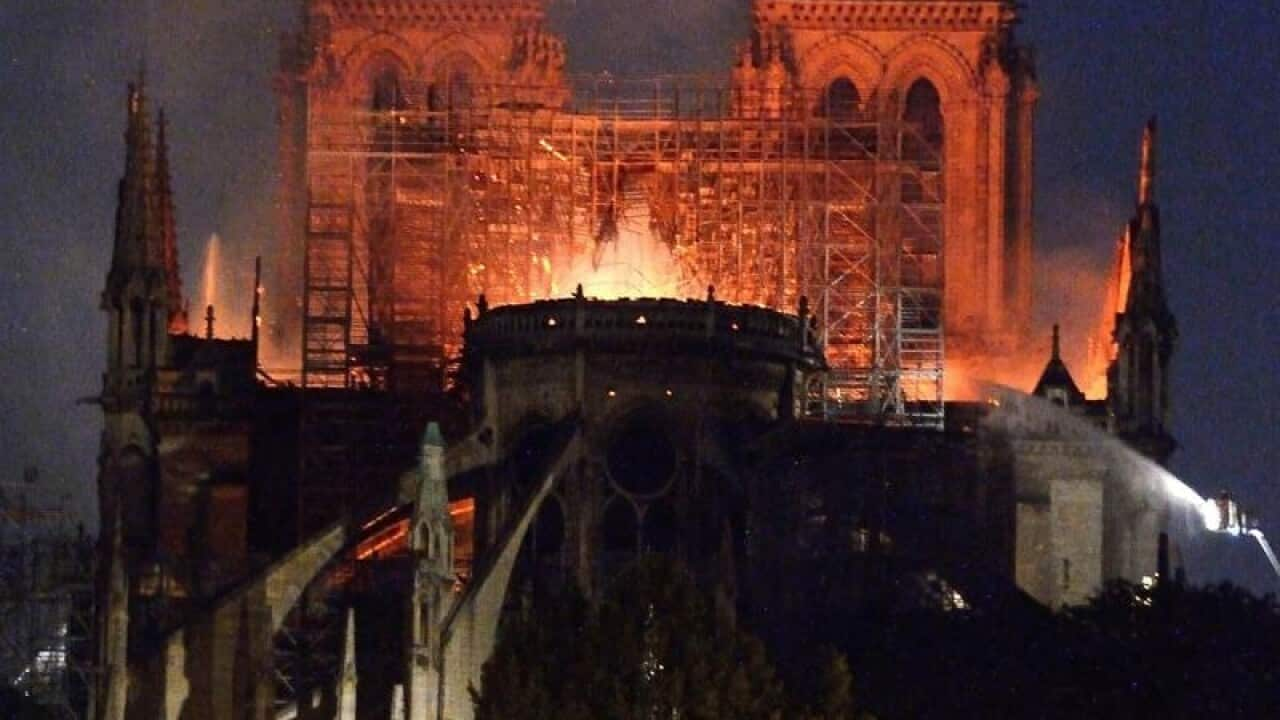The cathedral has been a symbol of Paris since the 12th century and is home to incalculable works of art.
It is one of the world's most famous tourist attractions, with almost 13 million people visiting each year.
It is also a UNESCO World Heritage site.
The medieval Catholic cathedral took more than a century to build, starting in the year 1160 under the reign of King Louis VII and was completed in 1345.
It is seen as one of the finest examples of French Gothic architecture and French history.

(The New York Times) Source: The New York Times
The building is renowned for its rib vaulting, flying buttresses and stained glass windows.
As well as its many carved stone gargoyles.

Notre Dame in 2017 Source: AP
Henry VI of England was crowned inside the cathedral in 1431 and Napoleon Bonaparte was crowned Emperor of France inside the building in 1804.
In 1909, Joan of Arc, who had helped her countrymen fight the English and was burned at the stake centuries earlier, was beatified in the cathedral by Pope Pius X.
The cathedral, whose name means ‘Our Lady’ in French, is the seat of the archbishop of Paris.
With the building now engulfed by fire, many wonder what will be left of it once the fire dies down.

The cathedral in flames Source: AAP

Notre Dame Cathedral burning Source: AAP
But it’s not the first time it has suffered damage. A centre of Roman Catholic faith, over the centuries Notre-Dame has also been a target of political upheaval.
History of damage:
Notre-Dame survived being ransacked by rioting Protestant Huguenots in the 16th century.
The last time it suffered major damage was during the French Revolution in 1790, after which it was left in a state of semi-neglect.
Victor Hugo’s 1831 novel, “Notre-Dame de Paris,” published in English as “The Hunchback of Notre-Dame,” told readers about the building’s bad condition.
The book led to a renewed interest in the cathedral and a major restoration that started in 1844; it was then that architects redid the spire and flying buttresses.
The building also survived two world wars largely undamaged.
Impact of the fire
Its 100-metre-long roof, of which a large section was consumed in the first hour of the blaze, was made out of wood and is one of the oldest such structures in Paris, according to Notre-Dame’s website.
The main structure of the cathedral was saved.

Inside the burning Notre Dame Cathedral Source: RTV
According to the cathedral's heritage director Laurent Prades, the high altar, installed in 1989, was hit by the cathedral's spire when it crashed down in the blaze.
But "all the 18th-century steles, the pietas, frescoes, chapels and the big organ are fine," he said.
The cathedral has three rose windows dating back to the 13th century, which are among its most famous features.
Mr Prades said they survived the fire.

The stained glass on the northern side of the Notre Dame cathedral in Paris. Source: CNN
Notre-Dame has two towers, both are 68m high, and climbing the 387 stairs gives scenic views of the French capital. They have survived the fire, according to French authorities.
Any visitor climbing up the stairs will have to walk by another of the cathedral’s well-known landmarks, the gargoyles.

A group of gargoyles.Date: 1894 Source: Mary Evans Picture Library
These mythical figures are made up of more than one animal, with the best-known one, called the "Stryge", sitting on top of the building, watching over the city of love with its head in its hands.
The cathedral has 10 bells, with the largest, known as Emmanuel, installed in the south tower in 1685. It weighs over 23 tonnes.
Relics and paintings
The priceless collection of artwork inside the cathedral was partly recovered.
Notre-Dame is home to relics from the Passion of Christ, described as a piece of the cross, a nail and the Holy Crown of Thorns.

The Crown of Thorns is a relic of the passion of Christ. Source: CNN
The crown has been rescued from the flames, according to authorities.
Notre-Dame’s top administrative cleric, Monsignor Patrick Chauvet, said the tunic worn by Saint Louis, a 13th-century king of France, was also saved.










